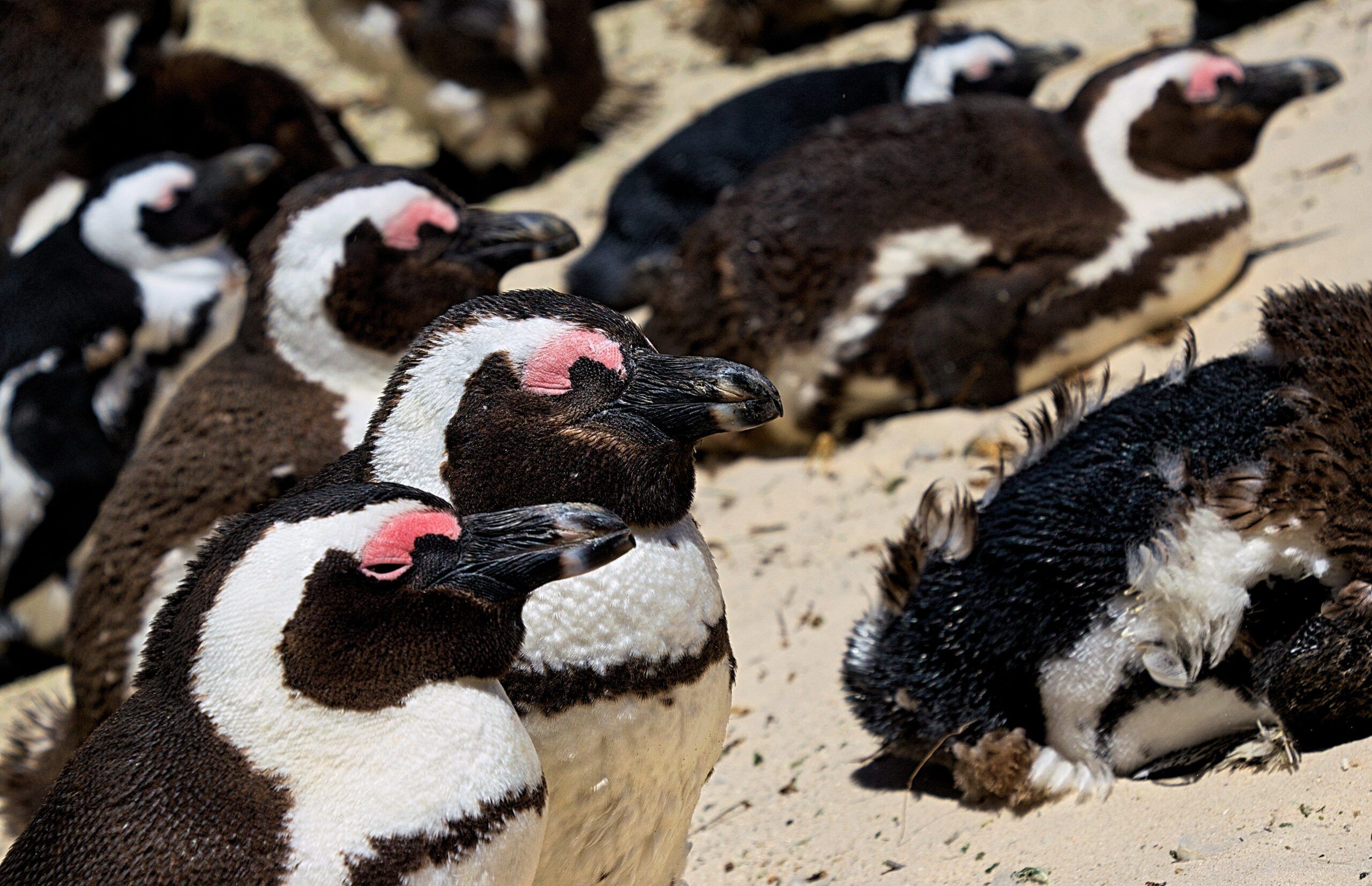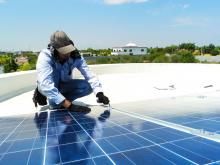Of Penguins & Solar Panels

Here’s a surprising penguin fact: much like our own communities, African Penguins and the ecosystems they’re part of benefit from our transition away from fossil fuels and toward renewable energy.
Like many people, we at the New England Aquarium believe in safeguarding people and places from harm, for the well-being of both animals and people. Our use of fossil fuels – like coal, oil, and natural gas – for energy releases excess carbon dioxide into the atmosphere. In the atmosphere, carbon dioxide acts like a heat-trapping blanket, preventing Earth’s heat from escaping, which warms the planet, including the ocean.
Many marine animals thrive in very specific temperature ranges and, as the ocean warms, they are moving toward the poles or to deeper waters, disrupting the food chain. Penguins, like the ones you see at the Aquarium, are finding that their food sources are shifting.

The key to protecting our planet is reducing our fossil fuel consumption at a community level. Fortunately for us, we have initiatives like Solarize Massachusetts, a program that increases the adoption of small-scale solar electricity by encouraging communities to join together to lower purchase prices.
58 communities have already joined this effort, and we encourage our visitors to share what they have learned with their town and get them involved. Switching to renewable energy helps us, helps penguins, and helps the ocean!
More Blog Posts
 A Scientist’s Take On Communication TrainingA Scientist’s Take On Communication Training By Evelyn Beaury, August 27 2019 My lessons learned from NNOCCI’s keys to successful climate change conversations – let’s solve this together! With such a polarizing, politicized, and frightening subject, it’s easy to slide into contentious conversation when talking about climate change. I [READ MORE]
A Scientist’s Take On Communication TrainingA Scientist’s Take On Communication Training By Evelyn Beaury, August 27 2019 My lessons learned from NNOCCI’s keys to successful climate change conversations – let’s solve this together! With such a polarizing, politicized, and frightening subject, it’s easy to slide into contentious conversation when talking about climate change. I [READ MORE] NNOCCI Climate Science FundamentalsNNOCCI Climate Science Fundamentals by Megan Ennes, July 15 2020 In this blog, we talk about some of the basics of climate change. An understanding of climate science is the foundation of climate communication and action. Weather Versus Climate One of the most common misunderstandings when talking about climate change is the difference between [READ MORE]
NNOCCI Climate Science FundamentalsNNOCCI Climate Science Fundamentals by Megan Ennes, July 15 2020 In this blog, we talk about some of the basics of climate change. An understanding of climate science is the foundation of climate communication and action. Weather Versus Climate One of the most common misunderstandings when talking about climate change is the difference between [READ MORE] Attention Environmental Advocates: Avoid ‘Cute Critters’ and other Communications TrapsAttention Environmental Advocates: Avoid ‘Cute Critters’ and other Communications Traps August 09 2016 This is the second in a series about framing ocean and climate change. A fuzzy polar bear cub against an expanse of melting snow. A seal pup slicked in oil. A newborn orangutan clutching its mother’s breast as she swings through a disappearing [READ MORE]
Attention Environmental Advocates: Avoid ‘Cute Critters’ and other Communications TrapsAttention Environmental Advocates: Avoid ‘Cute Critters’ and other Communications Traps August 09 2016 This is the second in a series about framing ocean and climate change. A fuzzy polar bear cub against an expanse of melting snow. A seal pup slicked in oil. A newborn orangutan clutching its mother’s breast as she swings through a disappearing [READ MORE] Fresh ideas for talking about ocean acidificationFresh ideas for talking about ocean acidification by Richelle Tanner, July 30 2020 Our NNOCCI associate, Dr. Scott Doney, along with his colleagues, has recently published an updated review of the effects of ocean acidification on marine ecosystems (see here for a previous review). Read on for a summary of their main findings, and to understand [READ MORE]
Fresh ideas for talking about ocean acidificationFresh ideas for talking about ocean acidification by Richelle Tanner, July 30 2020 Our NNOCCI associate, Dr. Scott Doney, along with his colleagues, has recently published an updated review of the effects of ocean acidification on marine ecosystems (see here for a previous review). Read on for a summary of their main findings, and to understand [READ MORE] The Problem with Solutions & How to Fix ItThe Problem with Solutions & How to Fix It April 05 2017 This is the seventh and final post in a series about framing climate and ocean change. When environmental advocates talk about problems, they sometimes leave out one of the most important parts of the discussion: solutions. This error of omission has significant consequences. When the [READ MORE]
The Problem with Solutions & How to Fix ItThe Problem with Solutions & How to Fix It April 05 2017 This is the seventh and final post in a series about framing climate and ocean change. When environmental advocates talk about problems, they sometimes leave out one of the most important parts of the discussion: solutions. This error of omission has significant consequences. When the [READ MORE]